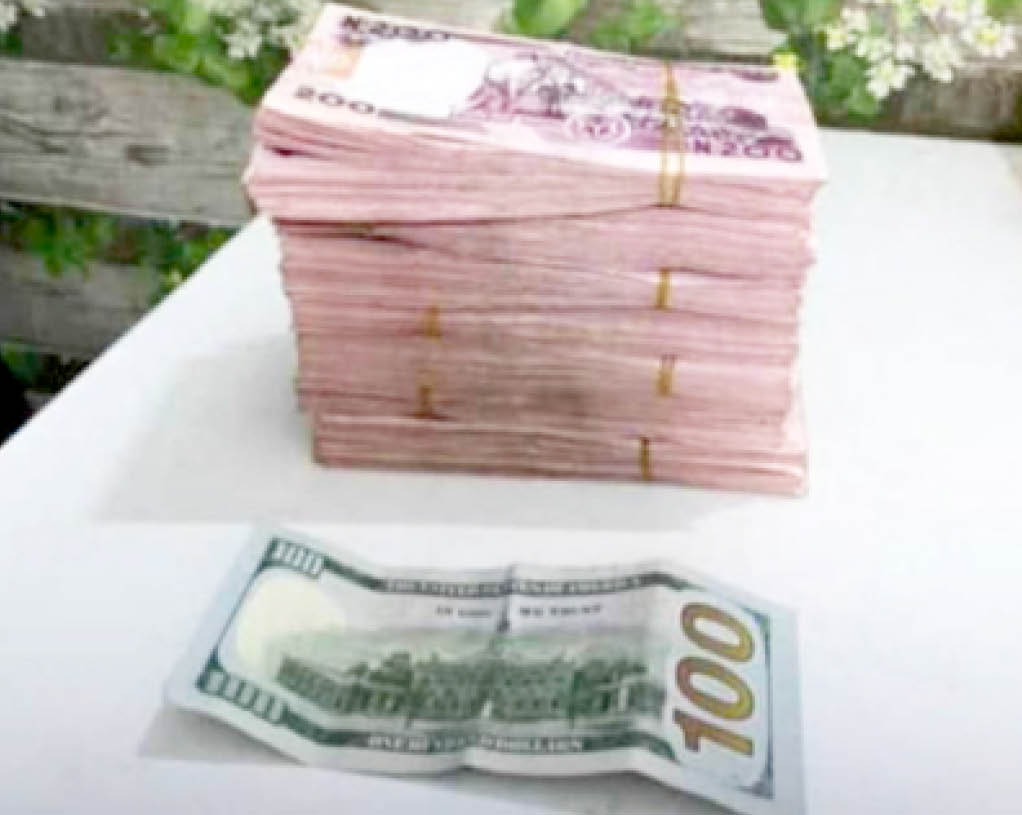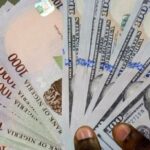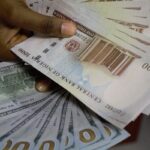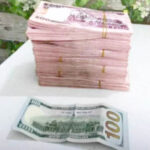Naira continued its free fall with the exchange rate plummeting to over N1,500 and above N1,800 against dollar at the official and parallel market respectively on Tuesday, despite efforts by the federal government to arrest the trend.
The situation is negatively impacting on the country’s economy and subjecting millions into hardship owing to soaring prices of commodities.
In a bid to improve liquidity, boost investors’ confidence and stabilise the Nigerian forex market, the Central Bank of Nigeria (CBN), on June 14, 2023, liberalised the naira through a free-floating policy which allows demand and supply forces to determine the value of the currency.
The decision, instead of yielding positive results, saw the country’s currency losing more value against dollar and other foreign currencies, plunging the economy into deeper crisis and pushing more Nigerians into poverty.
Naira free fall: NSA orders clamp down on forex speculators
Despite FG’s clampdown: Dollar hits N1,900; pound, N2,250
To save the naira, the CBN has taken some measures all of which have failed so far. From obtaining loan to stabilise the local currency to issuing threats to speculators and repeated raids of Bureau de Change offices by the Economic and Financial Crimes Commission (EFCC), all the efforts have defied lasting solutions.
Injection of millions of dollars into banks
In an effort to lessen the pressure on the country’s exchange rate and attract investors, the CBN in 2022, injected the sum of $17.81bn into the inter-bank foreign exchange market in addition to the $16.55bn it committed in 2021.
In January 2024, the Apex Bank injected about $61.64 million to offset debts owed to foreign airlines through various banks. This was in its bid to clear the backlog of pending matured foreign exchange (FX) in Deposit Money Banks (DMBs).
The CBN had also paid approximately $2billion as part of efforts to clear the backlog of outstanding foreign exchange liabilities across various sectors.
The apex bank also infused $500 million into the forex market in January 2024, to “address fundamental issues hindering the effective operation of the Nigerian FX markets to boost investor confidence and attract foreign investment,” said Hakama Sidi-Ali, Acting Director of the Corporate Communications Department at the CBN.
President Bola Ahmed Tinubu on Tuesday in Abuja at the inaugural Public Wealth Management Conference organised by the Ministry of Finance Incorporated (MOFI) disclosed plan to raise $10 billion to increase foreign exchange liquidity to stabilise the naira and grow the economy.
The Vice President Kashim Shettima, who represented the President at the function, said in a statement by his spokesperson, Stanley Nkwocha, that “The Federal Government set a goal to raise at least $10 Billion in order to increase foreign exchange liquidity, a key ingredient to stabilise the Naira and grow the economy.”
Despite all the injections, the naira keeps losing value.
Raids on Bureau de Change Offices
In July, 2022, the operatives of the Economic and Financial Crimes Commission (EFCC) stormed a base of Bureau De Change operators in Wuse Zone 4 in Abuja, to dislodge speculators who were reportedly mopping up foreign currencies and contributing to depreciation of the naira.
In November 2022, the anti-graft agency launched another raid on Wapa forex market in Kano where it arrested at least eight BDC operators. But few days after the raid, as confirmed by some of the marketers, the dollar rose against the naira at the market.
In August 2023, the Joint Monitoring Task Force and the Aviation Security Crime Investigation and Intelligence Unit of the Federal Airports Authority of Nigeria arrested 21 persons among whom were “illegal foreign exchange dealers.”
In what appeared to be a renewed effort to stabilise the naira, the EFCC again clamped down on unlicensed BDC operators in Abuja, Kano and Lagos on Tuesday.
The operations were at the behest of the National Security Adviser, Nuhu Ribadu, who in a statement on Tuesday by Zakari Mijinyawa, the head of strategic communication in the office of the NSA, said the measure is to safeguard Nigeria’s foreign exchange market and combat activities of speculators, both domestic and international, who operate through various channels.
“To reduce the pressure on the naira, the EFCC raised a 7,000-man special task force across its 14 zonal commands to clamp down on dollar racketeers.
“Yet, recent intelligence reports have highlighted continued illicit activities within the Nigerian foreign exchange market. The ONSA and CBN are therefore embarking on this collaborative approach to tackle these infractions.
“This partnership will involve a coordinated effort with key law enforcement agencies, including the Nigeria Police Force, the EFCC, the Nigeria Customs Service and the Nigeria Financial Intelligence Unit (NFIU).
“The primary objective of this alliance is to systematically identify, thoroughly investigate and appropriately penalize individuals and organizations involved in wrongful activities within the FX market,” the statement read in part.
Hours after the raid and the arrests of “some speculators,” the naira plummeted further to N1,900/$. However, at the official market, the naira recorded a marginal gain closing at N1,551.24 as against the earlier N1,574.62, according to the Nigerian Autonomous Foreign Exchange Market (NAFEM).
CBN threat to speculators
The CBN in August 2023 warned speculators that its strategies and plans, once unveiled, would result in huge losses on their side while impacting positively on the forex market. In October 2023, the naira appreciated, gaining N175/$ at the parallel market. But the gain was short-lived as the dollar recovered and even gained more strength against the naira.
NNPC’s $3bn loan from AFREXIM
The Nigerian National Petroleum Company Limited (NNPCL) in August 2023 moved to obtain $3bn Emergency Crude Repayment Loan from the African Export-Import Bank (AFREXIM) to support the Federal Government in stabilising the naira and achieve other fiscal and monetary goals.
With the announcement of the commitment to secure the loan, Naira appreciated at the official Investors and Exporters’ (I&E) forex window and the parallel market, with a significant gain of N60 as the naira strengthened from N940/$ to N880/$.
However, as the deal dragged feet, Naira continued to depreciate against dollar at the market, weakening to between N920 and N925/$ at the black market as of then.
As the government’s attempts at steadying the naira failed to yield the desired results, doubts continue to trail the measures of the government to shore up the country’s faltering currency.
Experts warn against raid, others
Some experts who spoke to Daily Trust described the move as faulty, saying there are better ways to address the volatility.
An economist, Dr Oluseye Ajuwon, told Daily Trust that clamping down on BDC operators was not the solution to the foreign exchange crisis.
Ajuwon, a lecturer at the Department of Economics, University of Lagos, said the raid would only compound the problem.
He said, “There are some kinds of forex demands that you cannot go to banks to do. You have to resort to all these BDCs. The way they (the government) are going about it now is like pushing them into a darker place.
“The implication of that is that it would now become more expensive. I don’t see it solving any problem. Rather, it would compound the problem.
“What will create hoarding is if there is scarcity. If you can’t remove scarcity, there will be hoarding. If we really want to solve the problem, just remove the scarcity.
“Everything they (government) are doing now is a short-time measure. What they are doing now is trial and error and the way they are going about it is wrong.”
An Abuja-based think tank, Agora Policy, in a report titled ‘Steadying Nigeria’s Fledgling Foreign Exchange Reform’, urged the government to embrace a new policy to stabilise the market.
According to the body’s financial analyst, Wale Thompson, forex and monetary policies should be part of a comprehensive economic plan where the exchange rate serves as a tool for export diversification and for attracting capital flows to foster overall development.
“The long-stated objective of Nigeria’s policymakers is to diversify its export base which, given Nigeria’s labour abundance, distils to ensuring that industrial activity is geared towards the production of exportable goods that use a lot of low-skilled labour that is abundant in Nigeria.
“To ensure export competitiveness of these non-oil exports, exchange rate policies must look to deliver an extra layer of competitiveness to export prices in a form that favours domestic industries,” the analyst added.

 Join Daily Trust WhatsApp Community For Quick Access To News and Happenings Around You.
Join Daily Trust WhatsApp Community For Quick Access To News and Happenings Around You.


